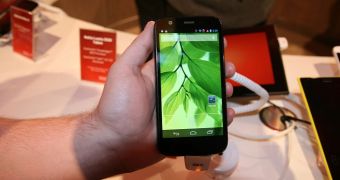During the Mobile World Congress in Barcelona this week, Motorola officials took their time to talk a bit about their relation with Google, their parent company for several months.
Google purchased Motorola back in 2011, but it had little influence on the company’s product roadmap, it appears. In fact, the Internet giant did not interfere with the building of Motorola’s latest smartphones, the Moto X and Moto G, it seems.
The info comes from three Motorola officials, namely Senior Vice President of Software Engineering Steve Horowitz, Senior Vice President of Supply Chain and Operations Mark Randall, and Product Manager Rick Austenwell, V3 reports.
Apparently, Google did not treat Motorola employees as its own people, but as it did with any other OEM representative out there, Horowitz stated.
"I wish we had a special relationship with the Android team but before meetings I waited in the lobby like everyone else. We got treated like any other OEM. Google was very careful to not give us any special treatment," he said.
Furthermore, Randall said that all product innovations that came from Motorola while under Google’s leadership came from the mobile phone maker alone, with Moto G being the best example of this.
"I think to when we were at the start of Moto G and going round and asking what people needed. I'd go everywhere taking feedback from customers and using it to find what people wanted," he stated.
Moto X is also an example of how Motorola itself delivered to the market appealing new products, without receiving actual help from Google, Austenwell stated.
“With the Moto X we set out to solve a very important list of user problems. For one, we made it so you could control it with your voice. We saw a massive uptake of use on this and helped change the way people use smartphones," he explained.
Both Moto X and Moto G mark a step away from Motorola’s previous approach to mobile phones, and the differences between these two devices and handsets included in the RAZR series are obvious.
The change was believed to be the result of Google’s influence on the company, but it appears that this was not the case. Horowitz underlined that Motorola decided by itself to go for a different strategy with its latest devices.
"This strategy lets us ship Android upgrades at a much faster rate than anyone else. For example we shipped our KitKat upgrade to the Moto X 19 days after release," he said.
Moving forth, Motorola will continue to release devices in line with the new approach, despite the fact that it was purchased by Lenovo several weeks ago. Moreover, Horowitz said that there are no plans to move to another mobile OS, and that such a step would hurt the company.

 14 DAY TRIAL //
14 DAY TRIAL //